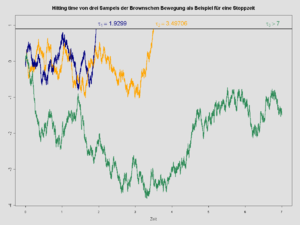
Back Stoppzeit German Tiempo de parada Spanish زمان توقف FA Temps d'arrêt French זמן עצירה HE Tempo di arresto Italian 정지 시간 Korean Stoptijd Dutch Moment zatrzymania Polish Марковский момент времени Russian

In probability theory, in particular in the study of stochastic processes, a stopping time (also Markov time, Markov moment, optional stopping time or optional time[1]) is a specific type of “random time”: a random variable whose value is interpreted as the time at which a given stochastic process exhibits a certain behavior of interest. A stopping time is often defined by a stopping rule, a mechanism for deciding whether to continue or stop a process on the basis of the present position and past events, and which will almost always lead to a decision to stop at some finite time.
Stopping times occur in decision theory, and the optional stopping theorem is an important result in this context. Stopping times are also frequently applied in mathematical proofs to “tame the continuum of time”, as Chung put it in his book (1982).
- ^ Kallenberg, Olav (2017). Random Measures, Theory and Applications. Probability Theory and Stochastic Modelling. Vol. 77. Switzerland: Springer. p. 347. doi:10.1007/978-3-319-41598-7. ISBN 978-3-319-41596-3.